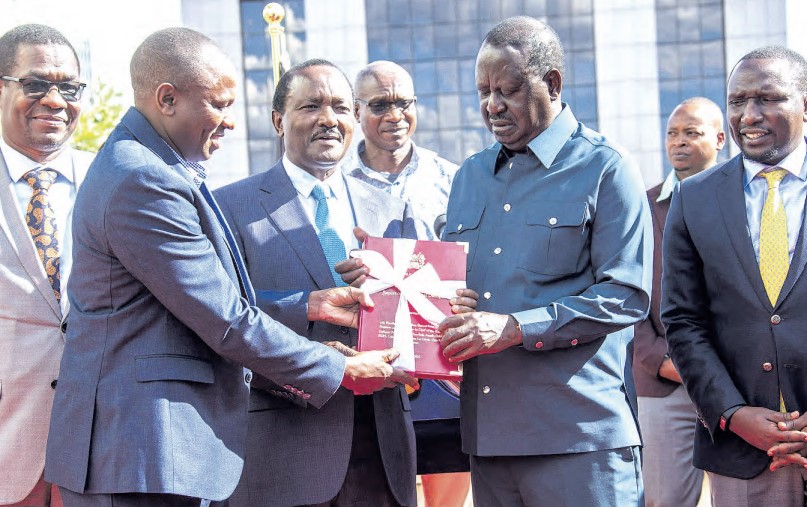
Kenya’s governance has long been shaped by regional inequalities and political tensions, often leading to an unbalanced system.
The National Dialogue Committee report offers a great chance to deal with these longstanding issues and suggests changes that could reshape our political structure for the better.
If we want to see national unity, accountability, and inclusivity, we must move quickly to implement the Nadco recommendations.
They target both the political and social challenges that have slowed progress.
One of the report’s key proposals is institutionalising the Prime Minister’s role, backed by two deputies.
This is not just about redistributing power but breaking down the ‘winner-take-all’ model, which leaves many without representation.
By embedding the positions of Prime Minister, Opposition Leader, and their deputies into the constitution, Kenya can build a more inclusive system.
It would ensure a fairer sharing of power across the country and among different groups.
This would reduce the dominance of any single region or political group and help marginalised communities feel they belong.
This approach is essential to tackle the political instability we see after elections.
Elections often result in a divided nation, with many feeling left out.
The Nadco proposal, which includes a President, Deputy President, Prime Minister, two Deputy PMs, and an institutionalised Opposition leader with a deputy, can help bridge this divide.
It spreads leadership across regions, promotes inclusivity, and lessens the tension that often follows elections.
Kenya has seen other attempts to reform the system, such as the Building Bridges Initiative and Dr Ekuru Aukot’s Punguza Mizigo, all aimed at solving similar problems.
However, these eff orts were often too political and lacked broad support. What makes Nadco different is that it came out of a national dialogue, making it more legitimate and with a better chance of success.
This dialogue off ers the best hope for a system of governance that prioritises inclusion over political gain.
Even considering recent political developments such as the Gen Z movement, the report can be very helpful in charting a way forward.
Many leaders, analysts and Kenyans believe previous reform efforts failed because they did not properly address the core issues behind political exclusion and imbalance.
The Nadco proposals, however, offer a strong solution to the ‘one-man-takes-it-all’ problem that has driven regional inequalities for years. Implementing these recommendations would not only bring fairness to political representation but also help stabilise the country by ensuring leadership reflects the interests of all citizens.
The President has been vocal in calling for oneness in political leadership and quickening his government about the development and delivery of services to citizens.
The report suggests a comprehensive restructuring of the Independent Electoral and Boundaries Commission.
This is crucial for restoring public trust in our elections.
The proposals, like expanding the selection panel for IEBC commissioners and extending timelines for solving election disputes, would lead to a more transparent and accountable electoral system.
With Kenya’s history of contentious elections, these reforms are key to strengthening our democracy and ensuring elections reflect the true will of the people.
The report also touches on important socio-economic issues. With the cost of living rising, Nadco calls for fiscal restraint in government, such as cutting travel expenses and reviewing daily allowances for public officers.
These measures are crucial for easing the pressure on public finances and promoting responsible governance.
By tackling public spending waste, the government can show a commitment to fiscal discipline, which is needed to regain public trust and improve services.
The report also focuses on completing the transfer of devolved functions to county governments, recognising that devolution is crucial for regional balance.
Ensuring local authorities are properly funded and empowered will help build a system of governance that responds to the unique needs of each region.
The recommendation to allocate at least 20 per cent of national revenue to counties shows the importance of devolution in ensuring all regions benefi t from national development.
Also vital is fixing the historical injustices that have left some areas behind in infrastructure and services.
The report also promotes accountability in public service.
By setting high ethical standards and introducing strong oversight mechanisms, these proposals aim to build a culture of integrity among public officials.
Strengthening ethical governance is crucial for rebuilding public trust in institutions and ensuring those in power act in the nation’s best interests.
The Kenya National Integrity Alliance has always stressed integrity in public service, and the Nadco report calls for a governance culture that is transparent and accountable.
Furthermore, the report offers a clear path to reimagining the governance structure. Its recommendations are more than just administrative changes; they aim to reshape our political and socio-economic landscape by promoting fairness, accountability, and regional balance.
Institutionalising key leadership roles, reforming the electoral commission, and pushing for fiscal responsibility are all vital steps towards a more stable and inclusive future.
Implementing these proposals is not only necessary to resolve longstanding political tensions but also to create a governance system that works for all Kenyans, regardless of their region or political affiliation.
The Nadco report presents a rare opportunity. It provides the tools to tackle systemic governance failures and create a more just and equal society.
By committing to these reforms, Kenya can leave behind its divisive past and build a future in which political inclusion and accountability are at the heart of national progress.
Caleb Mwamisi is a political commentator

